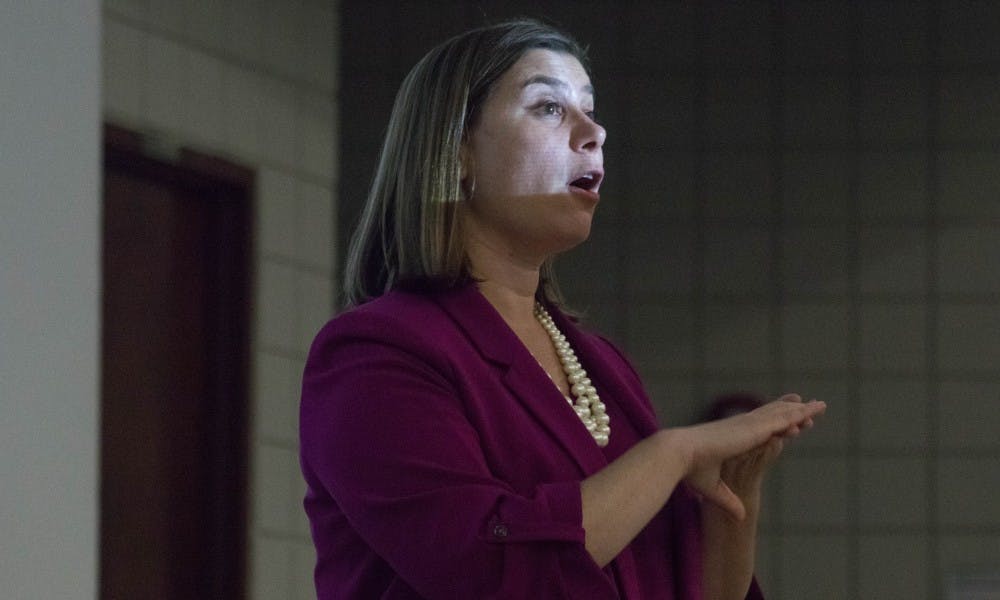U.S. Representative Elissa Slotkin (MI-8) spoke with Michigan State students and faculty Jan. 24 in the Erickson Hall Kiva room.
Audience members asked Slotkin a variety of questions, from foreign policy to marijuana legalization, but the most common questions asked were about mental health.
"I don't think it's an exaggeration to say that we are experiencing, certainly in our state, but probably well beyond our state, a mental health crisis," said Slotkin. "And I think there's a couple reasons, one, I think -- in a good way -- we're acknowledging that healthcare for your neck and up is just as important as healthcare for your neck down. and has just as much of a role, if not more in your overall health and success."
Slotkin said that a lack of mental health professionals is a contributing factor to the current mental health crisis.
"We're struggling because we don't have enough slots for people being trained as mental health professionals, from psychiatrists down to the social workers who are capable with dealing this. My background is national security. When you have demand way outstripping supply, that's the definition of a crisis."
Mark Patishnock, Director of MSU Counseling and Psychiatric Services, or CAPS, said that in a 2018 Olin report, stress and anxiety always land in the top 10 factors impeding a student's academic performance.
"About 68% of students report stress as their most common health concern," Patishnock said. "And that's above every other concern."
Anxiety ranked fourth, with cold and flu being second and sleep issues ranking third. Depression came in ninth place.
In that report, 49.9% of students claimed to be overwhelmed with schoolwork within the last two weeks, 51.2% claimed to have felt too depressed to function, at least once within the last year, and 21.4% had considered suicide within the last year.
Slotkin said that mental health issues were "systemic" and that the House of Representatives were working on bills to address mental health issues.
Slotkin addressed financial stress as a possible root cause of the mental health crisis, specifically the financial stress of seniors in college.
"It would be ideal that our living situation do not produce anxiety and mental health crises," Slotkin said. "It is very clear to me that, particularly the financial needs, exacerbates any normal stress that we would have when we're a seniors and we're trying to think about what we're gonna do next."
Patishnock said 30% of students that used CAPS services described their financial situation as either "always stressful" or "often stressful."
Patishnock also said that around 14% of students are worried about not having enough food to eat.
Slotkin continued, saying that student debt was a contributing factor to finance-related mental health issues.
"You guys are saddled with significantly more debt than even our generation ... and (Slotkin's aide is) still paying off her student debt," Slotkin said. "And I think that is where we need significant change in how we do college tuition."
"For me at the beginning of college I was having to take out loans and pay for them and that was super stressful," education junior Olivia Aurand said.
"I was worried that I wasn't going to pay off any of my student loans and that was a big anxiety for me, but this year I came into a situation where I was able to pay for a little bit more school myself, so actually being able to pay for school has alleviated a lot of stress for me but it definitely was a stresser at the beginning of college," Aurand said.
Slotkin's proposed solution to student financial debt was free two-year community college.
"Anyone that graduates high school and qualifies but maybe can't afford to go to a big university can always get a college education from one of our great community colleges."
Support student media!
Please consider donating to The State News and help fund the future of journalism.
Slotkin described student loans as "an investment in your future" that should have lower interest rates, at 2.5%, and also give students the ability to refinance their student loans retroactively to the 2.5%.
Slotkin also warned of overspending and moving government funds around.
"There's no such thing as free anything ... but that doesn't mean the way we handle tuition sets your generation up for success. It does not." she said.
Discussion
Share and discuss “Rep. Slotkin addressed student financial stress at MSU forum” on social media.








